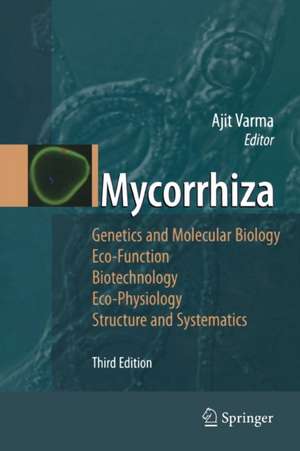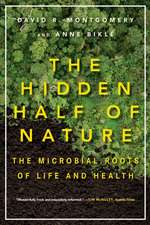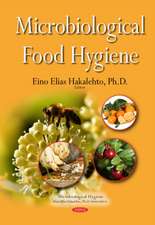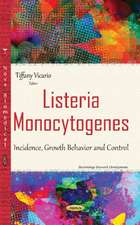Mycorrhiza: State of the Art, Genetics and Molecular Biology, Eco-Function, Biotechnology, Eco-Physiology, Structure and Systematics
Editat de Ajit Varmaen Limba Engleză Paperback – 25 aug 2008
This book is perfectly timed for the worldwide explosion of interest in mycorrhizal research. With a strong emphasis on the latest findings in genetics and molecular biology, it contains all current information and speculation on the structure, function and biotechnological applications of mycorrhizas.
| Toate formatele și edițiile | Preț | Express |
|---|---|---|
| Paperback (1) | 1949.97 lei 6-8 săpt. | |
| Springer Berlin, Heidelberg – 25 aug 2008 | 1949.97 lei 6-8 săpt. | |
| Hardback (1) | 1989.04 lei 39-44 zile | |
| Springer – 24 aug 2008 | 1989.04 lei 39-44 zile |
Preț: 1949.97 lei
Preț vechi: 2378.01 lei
-18% Nou
Puncte Express: 2925
Preț estimativ în valută:
373.22€ • 388.17$ • 312.76£
373.22€ • 388.17$ • 312.76£
Carte tipărită la comandă
Livrare economică 13-27 martie
Preluare comenzi: 021 569.72.76
Specificații
ISBN-13: 9783662495841
ISBN-10: 3662495848
Pagini: 797
Ilustrații: XXXI, 797 p. 5 illus. in color.
Dimensiuni: 155 x 235 mm
Greutate: 1.14 kg
Ediția:3rd ed. 2008
Editura: Springer Berlin, Heidelberg
Colecția Springer
Locul publicării:Berlin, Heidelberg, Germany
ISBN-10: 3662495848
Pagini: 797
Ilustrații: XXXI, 797 p. 5 illus. in color.
Dimensiuni: 155 x 235 mm
Greutate: 1.14 kg
Ediția:3rd ed. 2008
Editura: Springer Berlin, Heidelberg
Colecția Springer
Locul publicării:Berlin, Heidelberg, Germany
Cuprins
State of the Art.- Mycorrhizal Fungi: What We Know and What Should We Know?.- Diversity, Function and Potential Applications of the Root-Associated Endophytes.- Structure, Extent and Functional Significance of Belowground Arbuscular Mycorrhizal Networks.- Foraging for Resources in Arbuscular Mycorrhizal Fungi: What is an Obligate Symbiont Searching for and How is it Done?.- Global Diversity Patterns of Arbuscular Mycorrhizal Fungi–Community Composition and Links with Functionality.- Mycorrhiza Helper Bacteria.- Genetics and Molecular Biology.- Genomic Organization and Mechanisms of Inheritance in Arbuscular Mycorrhizal Fungi: Contrasting the Evidence and Implications of Current Theories.- Ectomycorrhiza and Water Transport.- Hypogeous Pezizaceae: Physiology and Molecular Genetics.- Evaluation of the Possible Participation of Drought-induced Genes in the Enhanced Tolerance of Arbuscular Mycorrhizal Plants to Water Deficit.- Eco-Function.- The Beneficial Effect of Mycorrhizae on N Utilization by the Host-Plant: Myth or Reality?.- Ion Dynamics During the Polarized Growth of Arbuscular Mycorrhizal Fungi: From Presymbiosis to Symbiosis.- Arbuscular Mycorrhiza in Metal Hyperaccumulating Plants.- Mycorrhizal Fungi and Other Root Endophytes as Biocontrol Agents Against Root Pathogens.- The Biocontrol Effect of Mycorrhization on Soilborne Fungal Pathogens and the Autoregulation of the AM Symbiosis: One Mechanism, Two Effects?.- Resource Partitioning Between Extraradical and Intraradical AM Fungal Mycelium.- Ozone Stress and Ectomycorrhizal Root–Shoot Signaling.- Biotechnology.- From Production to Application of Arbuscular Mycorrhizal Fungi in Agricultural Systems: Requirements and Needs.- Agronomic Management of Indigenous Mycorrhizas.- AM Inoculation in TropicalAgriculture: Field Results.- The International Market Development for Mycorrhizal Technology.- Why and How Using Micropropagated Trees rather than Germinations for Controlled Synthesis of Ectomycorrhizal Associations?.- Biotechnology and Cultivation of Desert Truffles.- The Fungal Transmitted Viruses.- Eco-Physiology.- Intertwined Existence: The Life of Plant Symbiotic Fungi in Agricultural Soils.- Macroecology of Microbes – Biogeography of the Glomeromycota.- Arbuscular Mycorrhiza of Endangered Plant Species: Potential Impacts on Restoration Strategies.- Community Developmental Patterns and Ecological Functions of Ectomycorrhizal Fungi: Implications from Primary Succession.- Colonization of Plant Roots by Pseudomonads and AM Fungi: A Dynamic Phenomenon, Affecting Plant Growth and Health.- In vitro Cultures Open New Prospects for Basic Research in Arbuscular Mycorrhizas.- Interactions of Piriformospora indica with Medicinal Plants.- In vivo Assessment of Stress Impact on Plant’s Vitality: Applications in Detecting and Evaluating the Beneficial Role of Mycorrhization on Host Plants.- Structure and Systematics.- Edible Mycorrhizal Fungi: Identification, Life Cycle and Morphogenesis.- Arbuscular Mycorrhiza in Physiological and Morphological Adaptations of Mediterranean Plants.- Novel Symbiotrophic Endophytes.- Frankia Nodulation, Mycorrhization and Interactions Between Frankia and Mycorrhizal Fungi in Casuarina Plants.
Recenzii
From the reviews of the third edition:
“The book is arranged in five parts and 36 chapters, each with an introduction, main contents and references. … All chapters are well referenced … and there is a good index at the back. … should be available in all good school, community and university libraries and any research laboratories dealing with agriculture or mycorrhizal research. A good book addressing the mycorrhizal fungi.” (K. D. Hyde, Fungal Diversity, Vol. 45, 2010)
“The book is arranged in five parts and 36 chapters, each with an introduction, main contents and references. … All chapters are well referenced … and there is a good index at the back. … should be available in all good school, community and university libraries and any research laboratories dealing with agriculture or mycorrhizal research. A good book addressing the mycorrhizal fungi.” (K. D. Hyde, Fungal Diversity, Vol. 45, 2010)
Notă biografică
Ajit Varma is also series editor of our series "Soil Biology".
Textul de pe ultima copertă
This third updated and revised edition emphasises strongly on genetics and molecular biology. It contains new chapters, which are written by the leading experts in their respective field of knowledge and expertise.
Mycorrhizas are symbioses between fungi and the roots of higher plants. As more than 90% of all known species of plants have the potential to form mycorrhizal associations, the productivity and species composition and the diversity of natural ecosystems are frequently dependent upon the presence and activity of mycorrhizas. The biotechnological application of mycorrhizas is expected to promote the production of food while maintaining ecologically and economically sustainable production systems.
Mycorrhizas are symbioses between fungi and the roots of higher plants. As more than 90% of all known species of plants have the potential to form mycorrhizal associations, the productivity and species composition and the diversity of natural ecosystems are frequently dependent upon the presence and activity of mycorrhizas. The biotechnological application of mycorrhizas is expected to promote the production of food while maintaining ecologically and economically sustainable production systems.
Caracteristici
Third updated and revised edition of the successful monograph on mycorrhiza With a strong emphasis on latest findings in genetics and molecular biology Includes supplementary material: sn.pub/extras




















